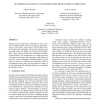Free Online Productivity Tools
i2Speak
i2Symbol
i2OCR
iTex2Img
iWeb2Print
iWeb2Shot
i2Type
iPdf2Split
iPdf2Merge
i2Bopomofo
i2Arabic
i2Style
i2Image
i2PDF
iLatex2Rtf
Sci2ools
143
click to vote
WSC
2007
2007
Bi-criteria evaluation of an outpatient procedure center via simulation
Surgical services require the coordination of many activities, including patient check-in and surgical preparation, surgery, and recovery after surgery. Each of these activities requires the availability of resources including staff, operating rooms, and intake and recovery beds. Furthermore, each of these activities has substantial uncertainty in their duration. The combination of a complex resource constrained environment, and uncertainty in the duration of activities, creates challenging scheduling problems. In this study we report on a discrete event simulation model of an outpatient surgical suite, and investigate the impact of several sequencing and scheduling heuristics on competing performance criteria.
Modeling And Simulation | Outpatient Surgical Suite | Resource Constrained Environment | Surgical | WSC 2007 |
| Added | 02 Oct 2010 |
| Updated | 02 Oct 2010 |
| Type | Conference |
| Year | 2007 |
| Where | WSC |
| Authors | Todd R. Huschka, Brian T. Denton, Serhat Gul, John W. Fowler |
Comments (0)

